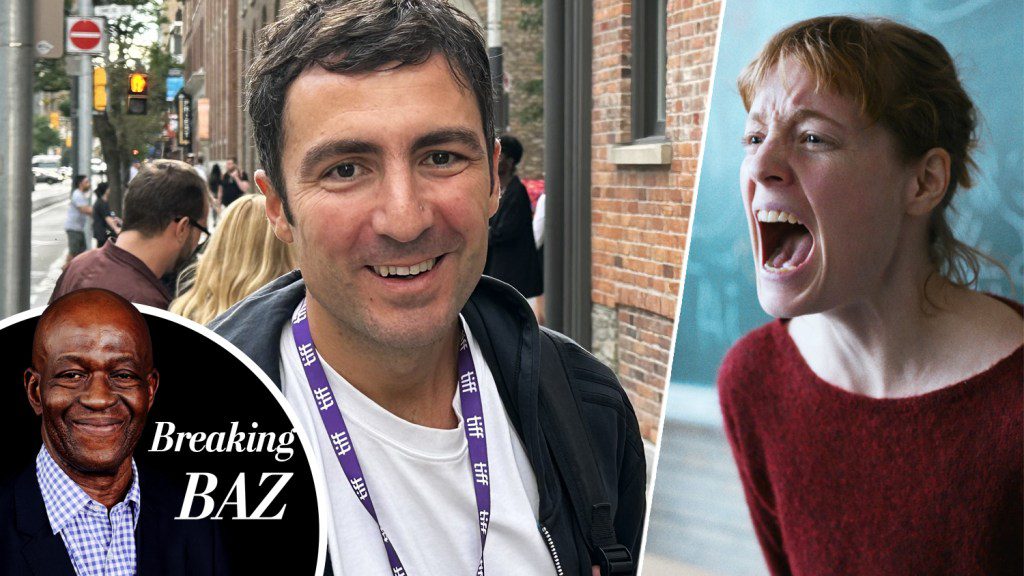[ad_1]
EXCLUSIVE: Filmmaker Ilker Çatak, whose terrific movie The Lecturers’ Lounge is Germany’s submission for Finest Worldwide Function on the 96th Academy Awards, desires to see and make movies that provoke.
However what precisely does that imply?
Effectively, in line with Çatak, most filmmakers, together with himself, can really feel a bit ‘identical,’ regardless of greatest intentions. “We’re all form of left-wing and woke, none of us are racist and now we have the identical values,” he begins throughout certainly one of a number of conversations we’ve held over current months at Telluride, TIFF and over e-mail. “Typically I really feel like I watch movies, and so they’re so secure. You realize the place the story’s going to, and I really need to see movies that typically provoke and should not aligned to my notion of the world.”
“I prefer it when a filmmaker makes a daring determination and dangers one thing,” provides the director, whose credit embody I Was, I Am, I Will Be and Stambul Backyard.
For instance, he says Yorgos Lanthimos’s Golden Lion-winning Poor Issues “was daring for a filmmaker to make.” I wholeheartedly agree. The identical goes for Paola Sorrentino and Justine Triet’s movies. I agree with that, too.
The Lecturers’ Lounge, which was acquired by Sony Photos Classics again in March for all rights in North America, Latin America and most European territories, is ready in a German college. Çatak sees “college as a miniature of society.”
“You’ve received the dean, you’ve received individuals with energy in cost, and then you definately’ve received the individuals, the scholars, and also you’ve received a faculty newspaper, which is representing the press. We thought — seeing as we reside in such hysterical occasions the place everyone simply desires to be proper and doesn’t hear anymore, the place it’s nearly cancelling the opposite individual or ‘different details’ as they get known as — that we thought this may be a pleasant playground to experiment in.”
Moderately, it’s a harmful playground, with Carla Nowak, as a brand new maths and bodily train instructor performed ferociously effectively by German actress Leonie Benesch (The White Ribbon, The Swarm) who finds herself on the heart of an incident involving cash stolen on college premises.
Lecturers ask the pupils to point out them their wallets. It’s such an intrusive act, however Çatak explains that in actuality each infraction is investigated to the nth diploma in German schooling. “We found that many German colleges have issues, clearly, however additionally they have insurance policies of zero tolerance.”

Çatak and co-screenwriter Johannes Duncker (Dämmerung) had carried out analysis, most of it organized by producing associate Ingo Fliess of Berlin’s IF Productions, then ran it by a number of lecturers. “Schooling is a really delicate subject in Germany,” says Çatak. “When you deal with it, it’s important to be ready for the shitstorm, and it’s important to actually do your analysis, so we talked to quite a lot of lecturers, to psychologists who work in colleges and we talked to college students, and I went to varsities and frolicked in lessons.”
He laughs as he recounts being again in school. “I sat there and I had the identical feeling that I had once I was a scholar. I felt drained. I needed to sleep, and I used to be like, ‘Why is college beginning at eight within the morning? Why?”
He provides it’s “a indisputable fact” that college students would study extra if colleges would begin later, however the actuality is most dad and mom want their youngsters dropped off earlier to allow them to start work at a contracted time. “Faculty is daycare,” says Çatak.
He remembers his dad and mom telling him by no means to query what a instructor mentioned. “These days, it’s the alternative. Dad and mom and college students are questioning the lecturers and lecturers have a far more tough time than they used to have. That’s additionally as a result of communication has gotten faster. There have been no WhatsApp teams or emails again within the day, however now it’s simply any single, tiny factor turns into a problem.”
Within the movie, a pupil of Turkish descent is singled out as a suspect within the theft. That scene, Çatak says, was impressed by an incident he and Duncker, who’ve been pals since childhood, noticed once they had been pupils themselves.
Çatak remembers the story of two boys who had been stealing, protected by the data that their classmates wouldn’t need to snitch. In the future, three lecturers ordered Çatak, Duncker and the opposite youngsters to place their wallets on a desk. “So we wrote the scene, and we confirmed it to working lecturers,” he provides. They confirmed related points occur “on a regular basis” however mentioned that you might not demand youngsters’s possessions until they voluntarily give them up.
He sighs as he remembers being singled out “because the Turkish child rising up in Germany.”
“You do get racially profiled.”
As he dug deeper into life at college, Çatak realized that the movie can be about youngsters’s rights. “That is additionally about the way you stand as much as a hierarchy that places you beneath strain,” he says.
There are not any victims in The Lecturers’ Lounge, he provides. “All people has to struggle and nobody backs down. That was the objective of the movie.”
And, whoosh! It’s like a nuclear warhead exploding.
“For me as a director, that may be a very grateful factor. You probably have battle and you’ve got friction in your scenes, that’s drama. You don’t must do something as a director as a result of the actors know what to do. They’ve a transparent objective.”
Becoming in
Çatak was born in Berlin to Turkish dad and mom. For probably the most half, he was the one “brown child” in his class. He realized a lot later in life that he would ”begin compensating with sure behaviours “to slot in. “You might be simply making an attempt to make it work and likewise be invisible, and you set additional effort in trying good, having every part ironed, so that you’re not the foreigner; the odd one out.”
All of us have these protecting mechanisms that we’re typically not conscious of after we’re younger, and I do know precisely what Çatak’s speaking about.
I used to be raised in Richmond, simply on the outskirts of London. There was one different Black child in my college. I used to get stopped by police on a regular basis and similar to Çatak, I’d study to decorate up so good that there must be a rattling good motive for the cops to cease me on my road.
When Çatak was 12 his household moved to Istanbul, returning to Germany when he was 18. His father labored for the postal service and his mom labored in a financial institution. “We’re principally working class individuals. My grandparents, who had been cloth employees, got here to Germany within the early Nineteen Seventies. They had been illiterates and so they discovered to put in writing and browse simply in Germany,” Çatak tells me.
Artwork was not a giant factor within the household. “I’m an solely youngster and for them crucial factor was to see me finding out,” he remembers.
After highschool, he studied economics at college in Berlin. He was sad. “I hated it, and my escape was the movie show. I went to the films on a regular basis. In some unspecified time in the future I went to the job heart the place you may have a free session in what you need to do together with your life. And the man mentioned, “What do you want doing?”
“I mentioned, ‘I like going to the films.’ And he mentioned, I ought to ought to make some. It was as simple as that,” says Çatak, his eyes brightening on the reminiscence.
By this time his pal Duncker was taking pictures brief movies, with Çatak performing in them. “We had been younger and we didn’t know what we had been doing,” says Çatak.

Alamode
However he knew that he must inform his dad and mom. “’Guys, I’m quitting my research to change into a PA,’ he advised them. And my dad and mom mentioned, ‘What’s a PA? What are you doing there?’
“Effectively, I used to be principally I’m simply blocking streets and making espresso for my bosses and whatnot. They went loopy.”
A part of their anger needed to do with the truth that that they had paid for his schooling in the course of the six years they’d spent in Istanbul. “That was college and also you don’t ship your child to such a faculty if the child doesn’t need to examine later.”
His dad and mom accused him of “throwing all of it away.”
It was the primary “actually large struggle” he’d had along with his dad and mom. “I used to be dwelling of their home, however not for lengthy. I moved out and lived on the couches of pals. My father mentioned, ‘Okay then, simply piss off and by no means come again.”
Çatak utilized to movies colleges and made extra brief movies. He was broke and didn’t know what he was doing along with his life. He began promoting ice-cream at a parlour in Kreuzberg, utilizing his earnings to finance his brief movies.
In some unspecified time in the future, he made one movie that he feels was was a turning level,” each in his profession and between father and son.
It began when Çatak returned to the household house for his mom’s birthday. The household began enjoying a phrase recreation and Çatak and his father quarrelled over whether or not Namibia was a rustic or a metropolis. Çatak was right — it’s a rustic — however he was heartbroken that his father hid the actual fact he didn’t know.
Çatak and Duncker ended up making a twenty minute movie known as When Namibia was a Metropolis.
His father is the movie’s lead.
The director despatched me hyperlinks to a number of of his shorts and earlier options over the course of our discussions. I watched When Namibia was a Metropolis again and again. It’s not the remotest bit imply about Çatak’s father. The digicam appears to like him. Figuring out the background, I discovered watching the brief tremendously shifting.

Baz Bamigboye
The sense that artwork may also help reconcile is so essential in our fractured society.
“That movie received quite a lot of invites to festivals, and I’d begin travelling with my father to them,” Çatak says with pleasure.
“My father, who fiercely fought me for changing into a filmmaker, and me can be at these Q&As, after which a movie critic made an inventory of the ten most exceptional performing performances of that yr, and there was my father, together with Robert de Niro.”
He takes a deep breath to maintain the emotion at bay. “That was a turning level the place he began additionally believing in me,” says Çatak. “He was the person who labored his life as a postman. I’d needed to clarify to him to start with what it means to be a director, however that was the place every part modified and the place I additionally thought, ‘Hey, perhaps I’m not too unhealthy at this.’ Issues after that advanced, and I saved writing and making brief movies.”
I puzzled about his dad and mom now. Are they nonetheless with us?
“Yeah. And they’re so proud,” he says with a beaming smile.
He notes how jubilant his dad and mom had been when The Lecturers’ Lounge gained prizes together with the Lola in Gold for Finest Function Movie on the German Movie Awards, together with the awards for greatest director, actress, screenplay and enhancing, beating front-runner — and multi-Oscar winner — All Quiet on the Western Entrance for the highest honor.
Germany has submitted The Lecturers’ Lounge as its entry within the Academy’s Finest Worldwide Function Movie class. Çatak’s father has been calling family in Anatolia to inform them concerning the movie’s success. “What’s shifting to me is the truth that they’re moved and pleased,” says Çatak.
He thinks again to one thing Brazil director Terry Gilliam as soon as mentioned about there being two sorts of movies: those which have a message and those that pose a query. ”I want posing a query as a substitute of a message,” says Çatak. “I prefer it when a movie upsets me or when a movie doesn’t fulfill me, and that is what cinema is to me. It’s an area the place I can put collectively the items myself; the place I can interpret one thing.”
The Lecturers’ Lounge doesn’t reply its elementary query, which I gained’t spoil right here, but it surely considers the function of guilt. This prompts Çatak to debate The Anatomy of a Fall, one other movie that explores related thematic questions.
He’s an incredible admirer of Justine Triet’s movie as a result of, finally, “it’s about how each society wants a scapegoat and the way we as a society want these sacrifices with the intention to maintain the machine working.”
However the larger query to come back out of The Lecturers’ Lounge has to do with fact, a degree to which Çatak nods his head in settlement. He ponders on “how everyone has their very own fact, how fact turns into a matter of subjective notion and the way everyone tries to make up their very own fact. If fact is one thing that you could bend, then it turns into a matter of perception.”
And we all know how harmful so-called different fact has change into. That’s why I really feel The Lecturers’ Lounge will discover a receptive viewers within the U.S. Çatak jokes that the scholar newspaper journalists in his movie would have put Donald Trump beneath a highlight he wouldn’t have appreciated.
‘Better of a era’
Actors mine a script and extract probably the most telling materials. That’s what Leonie Benesch does as Carla. Çatak hails her as the perfect of her era. “She’s a younger Isabelle Huppert,” he says. “She’s received one thing, like a magician. And I really don’t need to understand how the magician does this magic.”

Vivien Killilea/Getty Pictures for ABA
Nonetheless, he has ascertained that she combines “a mix of between focus and ‘laidback-ness’ in a means that I’ve by no means seen earlier than. She might come into the room and be utterly laid again and relaxed, after which increase, she’s concentrated and on level.”
He’d watched her efficiency in Michael Haneke’s 2009 Cannes prize winner The White Ribbon and needed to work together with her ever since. Within the intervening years, Benesch studied at London’s Guildhall Faculty of Music and Drama, sharpening and honing her expertise earlier than touchdown her function in Çatak’s buzzy movie.
However simply as integral to The Lecturers’ Lounge are the youngsters that populate its lecture rooms. They had been chosen after exhaustive casting classes, lots of which Çatak led.
Those that made the ultimate combine would have interviews with him. “I’d speak to them and say, ‘Okay, listed here are three issues. First, we’re a household and these are your brothers and sisters, and if any certainly one of us doesn’t really feel effectively, all of us care for that individual. Second, I would like you to have a piece ethic. I would like you to fall asleep early. I would like you to know your traces. I would like you to behave. And third, there are not any extras. You aren’t an additional. We’re one entity.”
He added one different level to them: “I’m not your boss and you aren’t the child that I speak to. We’re colleagues.”
Çatak’s proper to favor provocation in artwork. It’s enjoyable when a film makes you mad.
[ad_2]





